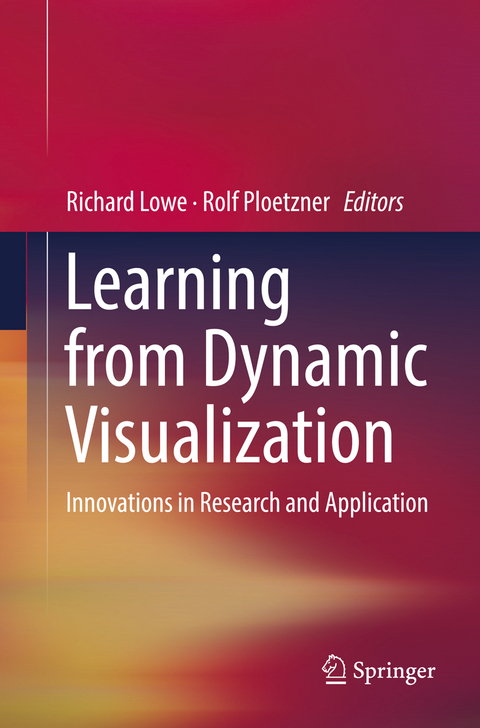
Learning from Dynamic Visualization
Springer International Publishing (Verlag)
978-3-319-85852-4 (ISBN)
This volume tackles issues arising from today's high reliance on learning from visualizations in general and dynamic visualizations in particular at all levels of education. It reflects recent changes in educational practice through which text no longer occupies its traditionally dominant role as the prime means of presenting to-be-learned information to learners. Specifically, the book targets the dynamic visual components of multimedia educational resources and singles out how they can influence learning in their own right. It aims to help bridge the increasing gap between pervasive adoption of dynamic visualizations in educational practice and our limited understanding of the role that these representations can play in learning.
The volume has recruited international leaders in the field to provide diverse perspectives on the dynamic visualizations and learning. It is the first comprehensive book on the topic that brings together contributions from both renowned researchersand expert practitioners. Rather than aiming to present a broad general overview of the field, it focuses on innovative work that is at the cutting edge.
As well as further developing and complementing existing approaches, the contributions emphasize fresh ideas that may challenge existing orthodoxies and point towards future directions for the field. They seek to stimulate further new developments in the design and use of dynamic visualizations for learning as well as the rigorous, systematic investigation of their educational effectiveness.
Richard Lowe is Professor of Learning Technologies at Curtin University, Australia. After undergraduate studies in science, he worked as an industrial chemist, science educator and textbook writer then completed a Ph.D. in Educational Psychology at Murdoch University, Australia. His research focuses on the effectiveness of explanatory graphics with a particular emphasis on learner processing of complex technical animations. He has a special interest in how the findings from such research can be applied to improving the design of dynamic graphics used not only within educational settings, but also across society more generally. Rolf Ploetzner received a Ph.D. in Psychology from the University of Freiburg, Germany, where he specialized in cognitive and educational psychology. Across his research career, he has participated in various research projects at the University of Freiburg, the Learning Research and Development Center (LRDC) at the University of Pittsburgh (U.S.A), and the Knowledge Media Research Center (KMRC) in Tübingen, Germany. Since 2002 he has been a Full Professor of Media in Education at the University of Education in Freiburg. In his current research he focuses on strategies for learning from dynamic and interactive media.
Introduction.- Section I. Innovations in Representation and Design.- A Composition Approach to Design of Educational Animations, Richard Lowe and Jean-Michel Boucheix.- Learning from Animations: From 2d to 3d? Stephan Schwan and Frank Papenmeier.- Looking Across Instead of Back and Forth: How the Simultaneous, Presentation of Multiple Animation Episodes Facilitates Learning, Rolf Ploetzner and Richard Lowe.- Learning from Static and Dynamic Visualizations: What Kind of Questions Should We Ask? Inga Wagner and Wolfgang Schnotz.- The Role of Craft-Based Knowledge in the Design of Dynamic Visualizations, Jodie Jenkinson.- Designing Instructional Science Visualizations in the Trenches: Where Research Meets Production Reality, Gaël G. McGill.- Section II. Innovations in Assessment.- Dynamic Visuospatial Ability and Learning from Dynamic Visualizations, Christopher A. Sanchez and Jennifer Wiley.- Demonstration Tasks for Assessment, Richard Lowe, Jean-Michel Boucheix and Benjamin Fillisch.- Assessing Science Inquiry and Reasoning Using Dynamic Visualizations and Interactive Simulations, Jodi Davenport and Edys Quellmalz.- Design of Effective Dynamic Visualizations - A Struggle between the Beauty and the Beast?.- Commentary on Sections I and II, Katharina Scheiter.- Section III. Innovations in Scaffolding.- Attention Guidance Strategies for Supporting Learning from Dynamic Visualizations, Björn De Koning and Halska Jarodzka.- Learning Three-Dimensional Anatomical Structures with Animation: Effects of Orientation References and Learners' Spatial Ability, Sandra Berney and Mireille Bétrancourt.- Section IV. Innovations in Learner Engagement.- Self-Generated Drawing: A Help or Hindrance to Learning from Animation? Richard Lowe and Lucia Mason.- Drawing for Promoting Learning and Engagement with Dynamic Visualizations, Mike Stieff.- Strategies for Learning from Animation With and Without Narration, Rolf Ploetzner and Bianka Breyer.- Guiding Cognitive Processing During Learning with Animations - Commentary on Sections III and IV, Richard E. Mayer.- About the Editors.- About the Contributors.- Index.
| Erscheinungsdatum | 05.03.2022 |
|---|---|
| Zusatzinfo | XVII, 386 p. 81 illus. |
| Verlagsort | Cham |
| Sprache | englisch |
| Maße | 155 x 235 mm |
| Gewicht | 6088 g |
| Themenwelt | Geisteswissenschaften ► Psychologie ► Pädagogische Psychologie |
| Medizin / Pharmazie ► Medizinische Fachgebiete ► Psychiatrie / Psychotherapie | |
| Naturwissenschaften | |
| Sozialwissenschaften ► Pädagogik ► Schulpädagogik / Grundschule | |
| Schlagworte | Assessment • Educational animations • educational outcomes • Effectiveness of dynamic visualizations • Improving learning • Instructional Design • Learning and Instruction • Learning animations • Scaffolding • science inquiry • Science reasoning • spatial ability • Spatial thinking • Student Engagement • Utility of visualizations |
| ISBN-10 | 3-319-85852-1 / 3319858521 |
| ISBN-13 | 978-3-319-85852-4 / 9783319858524 |
| Zustand | Neuware |
| Haben Sie eine Frage zum Produkt? |
aus dem Bereich


